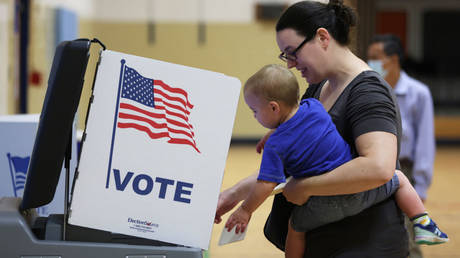
Federal officials have reportedly warned that Russia aims to “amplify doubts” about the integrity of the congressional midterms
US officials are once again pointing fingers at Russia over interference in American elections, reportedly warning that Moscow is trying to sow seeds of doubt about the legitimacy of November’s congressional midterms.
“Russia is amplifying divisive topics already circulating on the Internet – including doubts about the integrity of American elections – but not creating its own content,” the Associated Press reported on Tuesday, citing an unidentified FBI official. The outlet also obtained an unclassified intelligence advisory warning about potential election interference by Russia and China.
The red flags are just the latest in a long line of US election-interference accusations against Russia. A 22-month investigation in 2017-2019 failed to find evidence that Donald Trump’s campaign colluded with Russia to win the 2016 presidential election, but the media-hyped probe disrupted the new president’s policy agenda. Former intelligence officials and media outlets claimed Russian meddling again when allegations of influence-peddling by Joe Biden’s family surfaced weeks before the 2020 presidential election. The basis of the alleged scandal – a laptop abandoned by Hunter Biden – was later authenticated by the New York Times and the Washington Post, long after Joe Biden was elected.
China’s efforts in the midterm elections include targeting certain candidates whom it sees as opposed to its policy interests, the FBI official told AP. Beijing is taking a different approach in this year’s congressional races than it did in 2020, according to the US Department of Homeland Security (DHS). US intelligence agencies reportedly determined that Chinese officials considered trying to influence the 2020 presidential election but chose not to get involved.
READ MORE: Poll shows big shift in party preference for US midterms
“The current environment is pretty complex, arguably much more complex than it was in 2020,” DHS cybersecurity director Jen Easterly told reporters on Monday.




